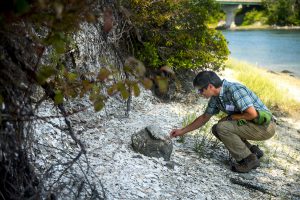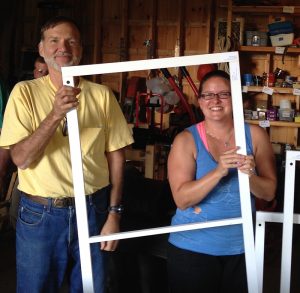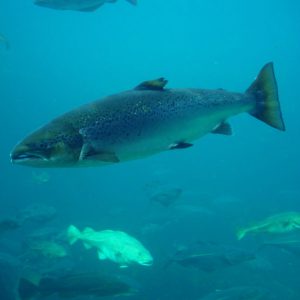Research teams focused on shell middens research, energy justice and sea-run fish in Maine receive Sustainability Grants
We’re excited to announce that six projects have been awarded Mitchell Center Sustainability Grants for fiscal year 2022. Three of the funded projects, focused on Indigenous community engagement in research on Maine’s shell middens, energy justice and community energy, and telling the stories of sea-run fish in Maine, are highlighted below. The other three projects were featured in a recent Mitchell Center news article.
Wabanaki Voices and Heritage Spaces: Advancing Indigenous Community Engagement in Shell Mound Research, Documentation, and Management in Maine
 Archaeological shell mounds along Maine’s coast represent important Indigenous heritage spaces that preserve a record of past lifeways and environments. The University of Maine has initiated or participated in several projects to address the vulnerability of shell mounds and potential cultural loss stemming from climate change impacts, including the UMaine Midden Minders citizen science initiative.
Archaeological shell mounds along Maine’s coast represent important Indigenous heritage spaces that preserve a record of past lifeways and environments. The University of Maine has initiated or participated in several projects to address the vulnerability of shell mounds and potential cultural loss stemming from climate change impacts, including the UMaine Midden Minders citizen science initiative.
With support from a partnership development grant from the Mitchell Center, a team led by UMaine faculty members Bonnie Newsom and Alice Kelley and graduate student Natalie Dana-Lolar are working with tribal representatives, the Abbe Museum, Schoodic Institute and Acadia National Park to increase Wabanaki stakeholder engagement in shell heap research, education and management.
Addressing Energy Justice Through Community Energy

Energy justice seeks to make sustainable energy solutions such as energy efficiency more accessible to traditionally underrepresented groups. Community energy involves a group of people coming together to solve an energy issue. This project addresses the solutions-side of energy justice with a pilot project on collectively building insulating window inserts, which can reduce heat loss, save energy and money, and protect the environment, in an Indigenous community.
The project team is partnering with WindowDressers, the Penobscot Nation Housing Department, and a Penobscot Nation citizen to implement a community workshop to build window inserts on Indian Island in September-October 2021. They will also conduct surveys and interviews, using new UMaine-Penobscot Nation Institutional Review Board process developed by Darren Ranco and others, to ensure this work follows protocols for decolonized social science research.
Telling Our Story to Build Sustainable Sea-Run Fish Populations in Maine

Maine’s rivers and streams are home to twelve native species of sea-run (diadromous) fishes, which migrate between freshwater and marine environments to complete their life cycles. These species provide ecological linkages between freshwater and marine biomes and have cultural, social and economic value to the Indigenous and non-Indigenous people of Maine.
Participants, including representatives from Tribal Nations, government agencies, conservation organizations and local champions, will work collaboratively and with guidance from a communication specialist to identify audiences and begin the process of developing messages to motivate action in support of sea-run fish conservation, restoration and management. This work will form the basis of continued collaboration among sea-run fish partners.
Congratulations to all recipients of this round of Mitchell Center Sustainability Grants. Look for updates and stories on their work in the months to come.
